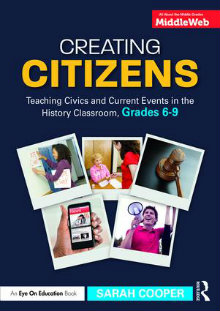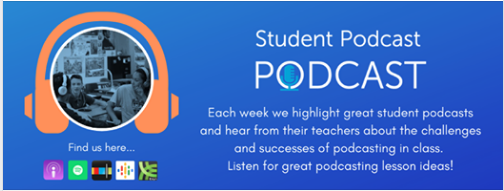A Social Studies Podcast Project for Right Now
A MiddleWeb Blog

In my eighth-grade U.S. history and civics class, which has a lot of curricular flexibility, we focus on different kinds of history each quarter:
• Quarter 1: Current events, geography and a personal approach to the news, ending with a current events spoken word poetry project.
• Quarter 2: The Constitution, including political and legal history, finishing with a freedom and power concept map and then a letter to a politician project.
• Quarter 3: Social reform movements such as abolition and women’s suffrage, focusing on social history, culminating with a reformers research paper and a reformers campaign project.
Quarter 4 usually winds us up with a focus on the Civil War, starting with the ethics of total war and continuing into the speeches of Lincoln and the still-gripping film Glory (1989). We typically end with an exploratory silent discussion or annotated bibliography to encourage one last burst of curiosity, especially in exploring the war’s legacy.
But “usually” has no place right now.
Like many teachers, once we dropped into online learning in mid-to-late March, I knew I wanted to do something different – something that, starting in mid-April, would:
• Relate to our present circumstances
• Offer students regular socializing and schoolwork opportunities in consistent groups
• Challenge kids while not stressing or overwhelming them
• Draw out their voices while also listening to voices of the past
So I decided to create a “resilient history project,” in which students construct a podcast focusing on a war or challenging time in the past and connect it somehow to the present.
Even though we’re only at the beginning of this project, I’m already wondering why I never before did something this immersive, personal and historical as a cap to the year.
Where to Start: Listening to Compelling Professional Podcasts
In my classes, students have occasionally chosen a podcast for a creative project option, and I’ve listened to podcasts to inspire my teaching, but I’ve never assigned a podcast project to the entire class.
To ramp myself up on skills and approach, I read through NPR’s Student Podcast Challenge site, which offers a wonderful overview for educators, as well as a MiddleWeb how-to piece by a veteran public radio reporter.
To immerse myself in content, I browsed through a number of historical podcasts. It wasn’t as time-consuming as it sounds, because if I got distracted or bored while listening, I simply went on to another one. I wanted high-interest, sparkling audio for these eighth graders.
During the first couple of days on the project, as a class we simply listened to various podcasts and responded to what worked. I started with a phenomenal 30-minute show that I had used last year, on the recommendation of an eighth-grade English teacher colleague: The Ring on Uncivil. It tells a gripping story about Mary Bowser, an African American spy who stole information from Jefferson Davis under his nose in his own house.
Although our podcasts will be only four to six minutes each, I explained that I wanted them to hear the power of a well-told historical story. And they heard it! Comments in our Google Meet chat and voice discussion included:
• “They used music and the pace of their speech to make the story engaging and suspenseful”
• “I liked how they emphasized how everyone underestimated (Bowser)”
• “I liked how they acted casual while they were speaking, but this actually brought up a lot of emotion for them”
• “It was cool to see all of the perspectives”
During the next class we listened to a couple of shorter podcasts. The first came from StoryCorps, Holiday Gifts That Can’t Be Bought (minutes 0:40-4:00), which I played so we could feel the story. Students noted that “you could hear the emotion in his voice” and “the small details made me feel the emotions.”
The next listen, nine minutes long, came from the BBC’s fascinating Witness History, which produces frequent short podcasts on just about everything. For popular appeal I chose The Man Who Published Harry Potter, and then students listened to two more podcasts from the site for homework, on everything from the Spanish flu to the first mobile phone.
Even though most of the eighth graders don’t regularly listen to podcasts, by the end of these days they had a sense of the tone and narration they might want to apply to their own stories.
Choosing a Topic
Many moments in U.S. history qualify as challenging times. For simplicity’s sake this spring, I decided to focus on nine conflicts, plus the Great Depression: the Civil War, World War I, World War II, the Korean War, the Vietnam War, the Persian Gulf War, 9/11 and the Iraq War.

National Archives at College Park / Public domain
During their first day of small group work, students met for 20 minutes online – in their own Google Meet, through FaceTime or Switch, or in a Zoom breakout group (my favorite for ease of navigation) – to list their top three wars and why they chose them.
Limiting the field of research had a significant advantage for me as an online teacher. Usually I love helping students discover strong sources while they do research in class. However, this messy, informal kind of class period would have been hard to recreate online.
Setting the topics in advance also allowed me to ask our librarian to compile a list of primary source sites for each war, meaning that every student would be finding quality documents from the outset. At least I hope they will!
What’s Next
This is as far as we’ve gotten right now, but here are the project guidelines if you would like to see the schedule and criteria (and my summary of our chats about the qualities of good podcasts). When we’re finished, in about a month, I’ll check back in to let you know how it went. And if you have feedback right now that I can use along the way, I’d love to hear it!






































Sarah, I love the criteria you set for yourself:
• Relate to our present circumstances
• Offer students regular socializing and schoolwork opportunities in consistent groups
• Challenge kids while not stressing or overwhelming them
• Draw out their voices while also listening to voices of the past
Sounds like such an awesome project for right now! And I admire your bravery in scrapping what you usually do in order to take this on. Let us know how it works out!
Lauren, thanks for highlighting these criteria. It’s amazing what we learn from constraints… which I guess is what this project is all about! I will keep you posted. Hope you are doing well.
Love this idea! Thank you for your commitment to helping kids find their voice in meaningful and authentic ways! I hope every social studies teacher in my district does this!
Sarah, thanks so much for your kind words! I would love to hear about how it goes, and what teachers learn, if they try this too.
Hi Sarah,
Thanks so much for sharing these marvelous ideas. Your article gave me some inspiration for conducting my lessons. I’m Indonesian language teacher and I think I can adopt some of your ideas in my writing and speaking classes. Cheers!